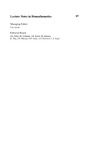Mathematical modelling of communicable diseases has in the past decades been the subject of intense research activity, on the part of both epidemiologists and biomathematicians; nonlinear forces of infection, spatial structure, age structure and other relevant features have been integrated to make the models more and more realistic and useful in prediction and control. The author's perspective in this book is that there is a concrete possibility of classifying most of the available models according to their mathematical structure, so to obtain a solid framework for analysing the behaviour of the modelled epidemic systems. This monograph suggests a possible classification of a large amount of models (bilinear, nonlinear, with or without structure), based on the Lyapunov stability theory and the theory of order preserving dynamical systems. The volume contains an original presentation of many worked out examples and case studies, mainly based on the author's experience, fully integrated with the exposition of the theory. It also contains a revisit of the most recent advances in the modelling of epidemics, including HIV/AIDS. Two appendices have been added for the ease of non-mathematicians. This monograph may be viewed as a research monograph for mathematically-oriented epidemiologists and for applied mathematicians. However, the detailed presentation of the methods make it a self-contained introduction to the mathematical modelling of infectious diseases so that it may also be used as a textbook in advanced courses of mathematical modelling in Biology and Medicine. The long and updated list of references makes this monograph a valuable survey of the subject.
In this second printing of the book the author has corrected all detected misprints, and updated the bibliography items.
 |
|
О проекте
|
|
О проекте


